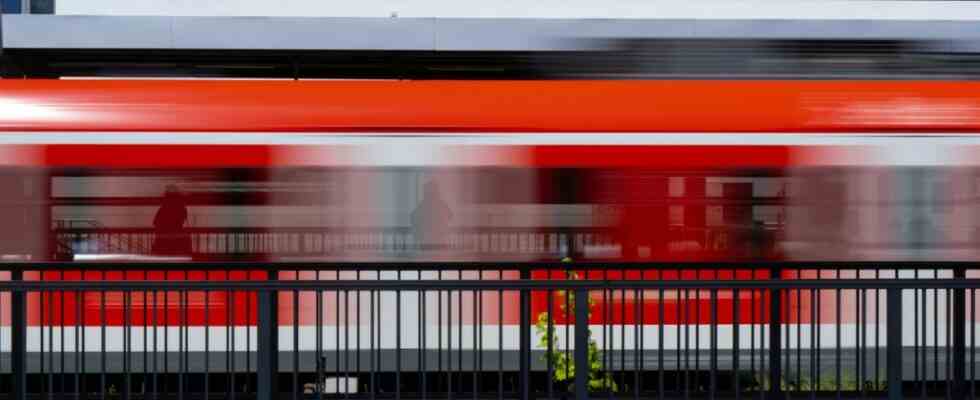The train and bus managers from all over Germany, who spoke about their worries and needs in a video session on Thursday last week, were pretty much in agreement: that’s not how the 49-euro ticket will work. Such an inexpensive monthly ticket, as planned by the federal government, is intended to lure more people away from their cars and onto public transport. But when will the best offer be of use, so the concern of the industry, if afterwards fewer trains and buses would run due to a lack of money from the state. It’s several billion euros.
The state-owned company Deutsche Bahn, the numerous private railways, many bus companies and the transport associations are looking to Berlin with a mixture of fear and hope. The heads of government of the 16 federal states will meet there with Chancellor Olaf Scholz (SPD) on Wednesday to talk about the energy crisis and much more. The 49-euro ticket for local transport planned by the federal government is also on the agenda; and the future of local transport in general.
The associations of train and bus companies and the transport associations are warning that things are currently in a bad way. Every few weeks, the industry’s top representatives hold video conferences. So also last Thursday, in a gloomy mood. For months, the local transport industry and the federal states have been waiting for an answer from Berlin to their complaints, which are presented there almost every week. There is a need to compensate for the sometimes rapidly increasing costs for energy, personnel and material. If the federal government does not finally provide more money for local transport, there will soon be major cuts in timetables.
The private railways warn that the situation is “threatening to exist”.
That can no longer be pushed back and forth, it must now finally be decided, according to the group of participants in the video round. With the private railways and bus companies that run on numerous regional lines, the question is no longer: will someone go broke. But: When will the first companies run out of money, when will the first companies go bankrupt. The situation is “threatening to exist,” warns Mofair, the association of private railways, in letters to the federal government, parliament and federal states.
Sitting together in the video round: The Association of German Transport Companies (VDV) including Deutsche Bahn, as well as the organizations of private railways and bus companies. With more than 600 members, including the transport associations from Munich and other cities, the VDV is the leading association in the industry. The VDV recently listed what the industry demands: 3.3 billion euros to compensate for increased electricity and diesel costs. In addition, an additional 1.5 billion euros per year for local transport in order to be able to maintain and expand the existing offer. Plus four billion euros as compensation for the 49-euro ticket. If this ticket comes, local transport would lose revenue, and there would be sales and conversion costs.
Three demands in the billions, that seems a bit like collective bargaining. Ask a lot to get a lot. But the public transport emergency is clear. The state governments see it that way too. They use money from Berlin, the so-called regionalization funds, to finance local public transport to a large extent. If trains and buses had to pay for themselves, the tickets would be so expensive that hardly anyone would get on.
Stephan Weil (SPD), Prime Minister of Lower Saxony, calls for more money from Berlin for local transport for the federal states. The federal government must “design the financial framework in such a way that the transport companies can cope with the rising costs of energy, materials and staff shortages”. Weil heads the conference of the heads of government of the countries. Bavaria’s Transport Minister Christian Bernreiter (CSU) believes that the 49-euro ticket will not start in early 2023. Too much is still open. “It doesn’t help if we have a cheap ticket, but in the end we don’t have anything that drives.”
Does the double boom drop something for local transport?
Weil, on the other hand, is confident that the federal and state governments will now agree on such a savings price ticket and its financing. “Such a ticket then enables environmentally friendly mobility and everyone has an interest in that.” It boils down to the federal and state governments sharing the cost of the 49-euro ticket. And that the states only participate if there is enough money for attractive local transport. Because says that in rural areas in particular, local public transport must be “further successively expanded”. What use is it to the people there “if they can buy a ticket for 49 euros, but you only have one bus in the morning and one in the evening”.
The federal states currently receive around ten billion euros a year from the federal government as regionalization funds for local transport; In addition, the federal states have their own funds in the billions. According to current plans, the regionalization funds are only to increase moderately. If the federal government does not add significantly more money here, a total of 30 billion euros will be missing by 2031 in order to be able to maintain and expand the existing offer. The transport ministries of the federal states recently calculated this.
According to government circles in Berlin, the federal government cannot solve the problems alone. The countries are also required. But they first want to know what the federal government pays. And in view of the increasing debt, he also has to keep an eye on state finances. The local transport companies, in turn, hope that their industry will also benefit from the 200 billion euro double boom to overcome the energy crisis.

